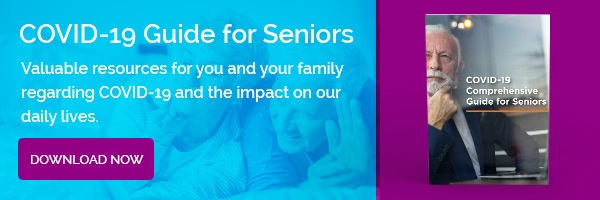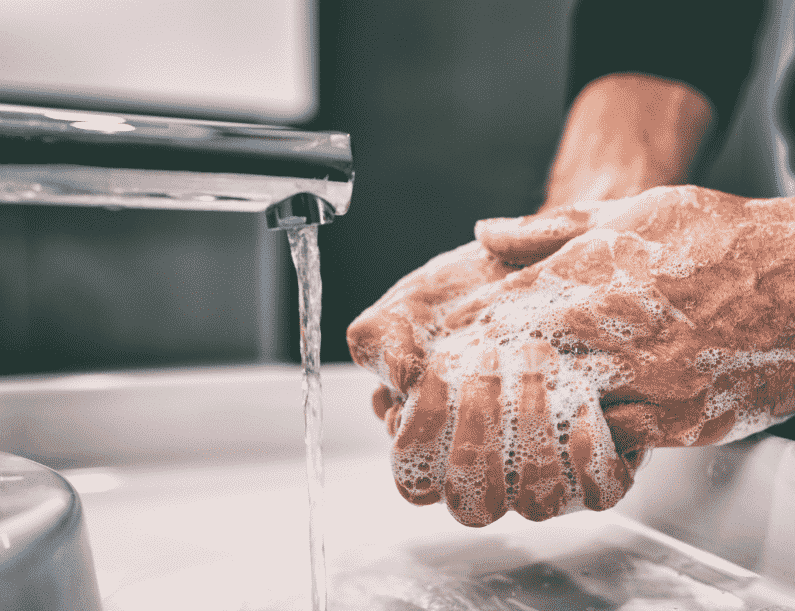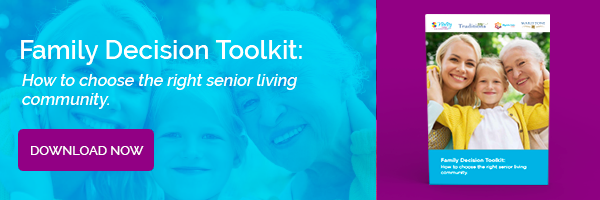By now you’re likely aware that seniors, ages 65 and up, along with people who have chronic medical conditions such as heart disease, lung disease, diabetes, cancer and hypertension are at higher risk for serious illness from COVID-19. Virtually everything you hear or read advises that extra precautions are taken. But what does that really mean? Here are some specific health and wellness tips to help you through the pandemic.
Why Are You High Risk?
Even for those perfectly healthy, the immune system grows weaker with age, which makes it more difficult to fight off infectious diseases such as COVID-19. In addition, chronic diseases, also more common with age, can compromise the immune system and make one more vulnerable to serious complications. That’s why it’s so important to reduce risk by following CDC guidelines such as:
- Stay home if possible
- Wash your hands often
- Avoid close contact (6 feet, which is about two arm lengths) with people
- Clean and disinfect frequently touched services
- Avoid all cruise travel and non-essential air travel
- Call your healthcare professional with concerns about COVID-19 and your underlying condition or if you are sick

COVID-19 Tips for Seniors
Here are some ways to put these CDC guidelines into action:
What to Have on Hand – When staying home you need to make sure you have enough food and medication to last for an extended amount of time, or that you have reliable delivery options.
- Medication: The Centers for Medicare & Medicaid is working with private plans to waive prescription drug refill limits and to relax restrictions on home or mail delivery of prescription drugs according to the National Foundation for Infectious Diseases. Many pharmacies are offering free delivery and/or shipping as well.
- Groceries: Most grocery stores now offer delivery options, but keep in mind with the higher volume of people using these services there may be limited availability so plan ahead. If you have to go in-store, check locally to see if they are offering special hours for seniors. Many are dedicating their first hour to allow seniors to shop with less risk of exposure.
- Food Delivery: If cooking is a challenge or if you’d like to support local businesses who are also struggling during this time, check for curbside pick-up options as well as services such as DoorDash and Uber Eats.
If You Have to Go Out – Sometimes, there’s just no way around it. But when you’re out, keep in mind that you should only wear a facemask if you are caring for someone who is sick (and they aren’t able to wear one) as they are in short supply and should be saved for caregivers. The same holds true for gloves. You may not realize that unless you are changing them between every interaction, it’s the same as wearing no gloves at all! However, you should take these precautions:
- Hand Sanitizer: Bring a bottle with you and use it right after you check out at the store.
- Credit Cards: Use this instead of cash as it harbors less bacteria.
- Disposable Bags: During this outbreak, forgo your reusable bags and go back to paper or plastic. If you feel you must stick with reusable bags, wash or sanitize them after each use.
- Disinfecting Wipes: Wipe down at least the handles of your shopping cart using either the ones the store provides or bring your own.
Clean and Disinfect – The CDC recommends doing this daily for all frequently touched surfaces such as tables, doorknobs, light switches, countertops, handles, desks, phones, keyboards, toilets, faucets and sinks.
- Store-Bought: Most common EPA-registered household disinfectants will work; just make sure to select the one most appropriate for the surface you’re cleaning.
- Make Your Own: Dilute your household bleach using 5 tablespoons (1/3rd cup) bleach per gallon of water or 4 teaspoons bleach per quart of water. Follow manufacturer’s instructions for application and proper ventilation. Make sure the product is not past its expiration date and never mix household bleach with ammonia or any other cleanser.
- Use an Alcohol Solution: But it must contain at least 70 percent alcohol to be effective.
What to Do About Office Visits – Most hospitals and physician’s offices are advising patients to reschedule elective procedures and to consider telemedicine options for non-emergent medical issues.
- Telemedicine Uses: Sinus infections, bronchitis, asthma, pink eye, allergies, keeping tabs on existing conditions like diabetes, examining moles or even treating anxiety or depression as examples.
- How it works: In general, you’ll have a video visit with a remotely located care provider over a secure connection. You use a website link or an app to connect with them.
- Insurance Coverage: The federal government is planning to expand telemedicine access for those with Medicare. It also urged states to expand the service to those enrolled in Medicaid. Many insurance companies and other providers are temporarily waiving fees as well. But make sure to check your specific coverage before making an appointment.
Your Mental and Emotional Wellbeing
Most of the focus has been around avoiding risk and what to do if you become sick, and rightly so, however, it’s important to look beyond the physical as well. To prevent anxiety, fear and stress from taking their own toll on your health you should:
- Take breaks from news stories and social media
- Help relax by taking deep breaths, stretching or meditating
- Eat healthy, well-balanced meals
- Exercise regularly, get plenty of sleep and avoid alcohol and drugs
- Make time to unwind with activities you enjoy
- Connect with others at a distance over the phone, with FaceTime or Skype, even stand on the front porch and shout to neighbors next door!
- Talk with people you trust about your concerns and how you are feeling
- Call your healthcare provider if these feelings affect your daily activities for several days in a row
To learn more about the advantages of senior living during this challenging time, contact a community near you today!



